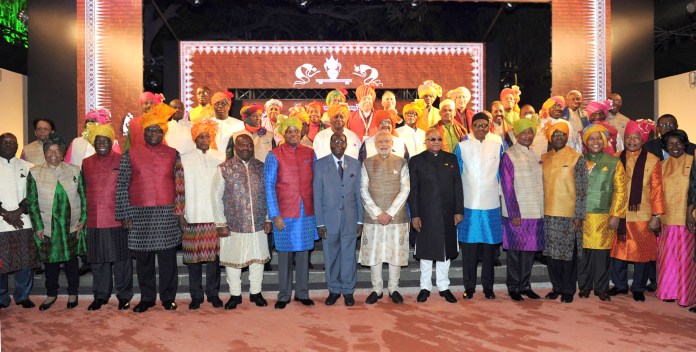Articles

Flyover design on PWD website soon; The Hindu, December 1, 2017
December 2, 2017
Rights of the Invisible Workers
December 13, 2017India and the Developing Africa
India–Africa relations are as old as the civilisations of the Nile and the Indus Valley. The earlier known contact between India and countries in Africa dates back to pre-historic times. Trade, people-to-people contact and cultural ties have remained significant for their effective engagement.
Today, this effective engagement depends on various imperatives that come from our shared historical and cultural links. India’s role in their anti-colonial struggle, encouragement for their democratic transitions and opposition to racial discriminations still resonates well with the younger generations of African countries.
The relative complimentary strength and capacities of India and Africa make them natural economic and commercial partners. India provides a stable and profitable market to the goods and services of Africa. In turn, Africa has the potential to contribute to India’s energy and food security requirements. There is a common approach in meeting developmental challenges and sustainable growth. India’s experience in manufacturing and services can come handy in meeting such challenges. However, the major issues African countries confront are healthcare, food security, climate change, sanitation, water, energy, poverty and resource constraints. These challenges can be met through cooperation by developing innovative solutions. There is much potential for learning from each other’s experience in capacity building programmes. India has already covered a wide range of sectors such as agriculture, science and technology, energy, infrastructure, communication, education and civil society among others. However, India has much to achieve and tap in Africa.
India v China in Africa
India is competing with China for strategic influence and for drawing on from as many investment projects as possible in Africa. China remains the major contender to India in Africa, and has been investing in the continent for decades. China has heavily invested in energy, telecommunications, infrastructure projects, and construction of railways, roads, airports, hospitals and schools. This has helped in spurring economic growth in Africa.
China has also opened its first overseas military naval base in Djibouti in the Horn of Africa. The operationalisation of this base will have implications in Africa as well as the Middle East, and will help China to fulfill its obligations of escorting missions in oceans and humanitarian assistance. The port development will bring economic and social development in Djibouti. The worrying part is that it clearly validates China’s global power aspirations.
China has undertaken major infrastructural and developmental projects across the African continent. It is also helping coastal nations to develop port facilities, and bringing in huge investments with strategic motives at its core. No doubt, China remains the major investor in Africa but questions regarding the lack of transparency and accountability of Chinese firms in the continent are gaining momentum. The fatigue factor is becoming the anti-incumbency factor for China. India can overcome this fatigue factor by replacing China.
This Time for Africa
The visible impacts of economic growth and development in Africa have sought the attention of the major powers in the world. The increase in the gross domestic product has been twofold during the past few decades in dozens of countries in Africa. The increase in growth is expected to continue till 2020. India has also started taking note of these developments.
India’s Africa policy majorly includes the India Africa Forum Summit (initiated in 2008), FOCUS Africa Programme and T-9 Initiative. These programmes necessitate intensive cooperation in security, trade and investment, development and energy partnership among others.
India has started investing intensively in diverse sectors of Africa, which include information technology, communication, education, healthcare, pharmaceuticals and, most importantly, agriculture, leading to the generation of growth, employment and development in the region. There has been an increase in Indian investment in Africa in recent years, which is largely seen in the Southern and East African countries.
India is following the steps of China in Africa. Like China, India is also building Africa’s infrastructure in exchange for acquiring natural resources from the continent. Indian Oil Cooperation, ONGC Videsh Limited and Mittal Energy Limited have signed agreements with various oil-rich African countries in exchange for the development of their local infrastructure. A case in point is a joint venture between ONGC Videsh Limited and Mittal Energy Limited that acquired oil exploration rights on the condition of developing oil refinery, power generation infrastructure and railway line network in Nigeria.
Through a joint venture of developing the ‘Asia Africa Growth Corridor’ (AAGC), India with Japanese technological assistance aims to promote prosperity and inclusive growth of African countries, and thus bridge the gap between Asia and Africa through infrastructural and developmental projects. AAGC is a sea corridor that will connect Africa with India and countries in Southeast Asia, Oceania and beyond. It is an ambitious initiative, which comprises developmental and cooperation projects, infrastructural capacity building and skill development.
With uncertainty eclipsing the international political and economic system, the stability of the global order is on the block. The developing economies of Africa seek nothing but peace and prosperity for their people. Therefore, India should commit to developing a strong relationship by engaging with the developing economies of Africa through various bilateral, regional and international groupings. This engagement should provide new directions to the growing relationship based on equality, mutual respect and cooperation in political, economic and social spheres. This will go a long way in reaching the potential, where both can benefit from each other significantly.
*This article is written by Gazi Hassan (Research Assistant, Centre for Public Policy Research). Views expressed by the author is personal and does not reflect that of CPPR.
This article was first published in The Dialogue.
Gazi Hassan is a Research Scholar of International Politics at CPPR, focused on Indo-Pacific dynamics. He has an MPhil in International Studies (Jamia Millia Islamia) and an MA in Peace Building and Conflict Analysis (Nelson Mandela Centre for Peace and Conflict Resolution, JMI).


